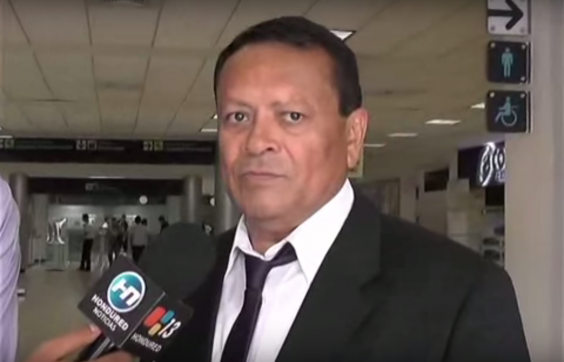Authoritarianism on the Prowl in Honduran Society

Persecuted Honduran journalist Julio Ernesto Alvarado. Image via Youtube user: HONDURED 13.
The Supreme Court of Honduras continues to ignore the international community and restrict freedom of the press by making an example of Julio Ernesto Alvarado and human rights defender Gladys Lanza.
At around 7 pm on October 29, 2015, a law enforcement officer arrived at the station where journalist Julio Ernesto Alvarado had finished broadcasting the program “Noticiera Mi Nación.” His purpose was to notify Alvarado of the suspension of his journalism license; he placed the notice on the doors of the station and left. Since October 30, Alvarado has not broadcast again on his GloboTV channel.

- Honduras has one of the world’s highest murder rates. It is also one of the most dangerous countries to practice journalism, ranking 129th out of 180 in the 2014 World Press Freedom Index. Journalists are regularly threatened, attacked, and killed for their work. The Honduran government fails to punish those who use violence against reporters, essentially granting them impunity. This space will be dedicated to examining the lack of protection for Honduran journalists exercising their profession. Topics will include the use of state-sponsored advertising as a mechanism to reward or punish publications, and censorship and self-censorship as hindrances to democratic progress.

- Born in Cofradía, Honduras, Dina Meza has been recognized by PEN International, Amnesty International, Index on Censorship and Reporters without Borders for her work as a journalist and human rights advocate. Currently, Dina is the driving force behind the creation of Honduras PEN Centre. In 2013, she wrote “Reign of Terror,” an in-depth report on threats to Honduran journalists for Index on Censorship’s magazine. In 2014, she was named one of Reporters Without Borders’ “100 Heroes and Heroines of Information.”
Julio Ernesto Alvarado was sentenced to a year and four months in prison and the suspension of his journalism license as a result of a defamation and slander lawsuit filed by the Dean of Economics at the Autonomous University of Honduras in December 2013. The Dean faced allegations from Alvarado on his program “Noticiero Mi Nación,” during which he accused the dean of awarding qualifications to students without following established procedures.
Although the Dean initially filed the lawsuit in 2006, nine years prior, she did not accept the decision of the court that dismissed this action as unfounded. Her attorney filed an appeal, which advanced silently, and the Criminal Chamber of the Supreme Court of Justice delivered a verdict plagued by errors of ineptitude: one year and four months imprisonment, the suspension of Julio Ernesto Alvarado’s journalism license, and the removal of other civil and political rights.
It has been a long battle in this case, where I have had to seek justice for the communicator journalist since the beginning of 2014, when I realized the arbitrariness and the cascading impact the ruling would have on everyone involved in journalism and communication in the country of Honduras.
The sentence against Alvarado exhausted all internal resources of the law that could be used to try and apply justice. The other way was to look for international justice in the absence of achieving it domestically. This sentence was meant to not only silence the perpetrator, but to set a precedent for other people, including human rights defenders such as Gladys Lanza. She, alongside her organization Women’s Peace Movement “Visitación Padilla” (Movimiento de Mujeres por la Paz Visitación Padilla), defends the rights of Honduran women.
Lanza was also sentenced to prison and suspension of her basic rights, including her ability to act as national coordinator for her organization. An officer from the Foundation for the Development of Social Housing (Fundación para el Desarrollo de la Vivienda Social or FUNDEVI) initiated this lawsuit in 2010. The officer filed the lawsuit after one of his employees reported him for sexual harassment at work and Gladys Lanza’s organization carried out a protest in front of the accused’s offices in support of the employee.
The trial court found her guilty due to the fact that she was defending a female victim of violence. Although the sentence may be commuted, for instance by paying a sum of money to avoid going to prison, she has said she will not do so because she would have to admit that she committed the offence. The case is currently under appeal in the Supreme Court of Justice. The freedom to continue defending the rights of women or prisoners depends upon the outcome of the case.
Both cases are emblematic of Honduras and, coincidentally, both carry an indirect message for journalists, social commentators, and those who defend human rights in Honduras, especially those of women: you will be attacked on all levels, and religious fundamentalist groups in the country will remain the main protagonists.
Julio Ernesto Alvarado has been out of his profession for several days. The Inter-American Commission on Human Rights, ICHR (Comisión Interamericana de Derechos Humanos, CIDH), has considered his case emblematic, and awarded an injunction on November 5, 2014 that requires the state of Honduras suspend carrying out the sentence whilst the international organization considers a case lodged in his favor. The State of Honduras has not recognized that order and continues to carry out the sentence. For the Diario El Heraldo newspaper, “it is one of those absurd cases that further damages the already damaged image of the country.”
In the case of Gladys Lanza, although she is not in prison, the judicial guillotine which is so common in Honduras hangs over her neck. This guillotine is applied against political dissidents, defenders of human rights, journalists, and social commentators in a country that lives in trying times because the authorities, beginning with the President of the Republic, are not concerned about violating signed international agreements.
Authoritarianism blankets my country. The recovery of the institutions of justice is urgent and will take many years, as “national security” shields those in power from these blows. To do this will take a lot of strength; otherwise, within a few years women may be obliged to be taken to public squares and lashed as a punishment. Without doubt, authoritarianism is on the prowl and it has to be confronted.





One Comment on "Authoritarianism on the Prowl in Honduran Society"
In both of these cases, the journalists where found guilty because they made unfounded accusations against individual persons. In the case of Mrs Lanza, she “defended” a woman who accused a co-worker of sexual harassment without any supporting evidence. Likewise the journalist.